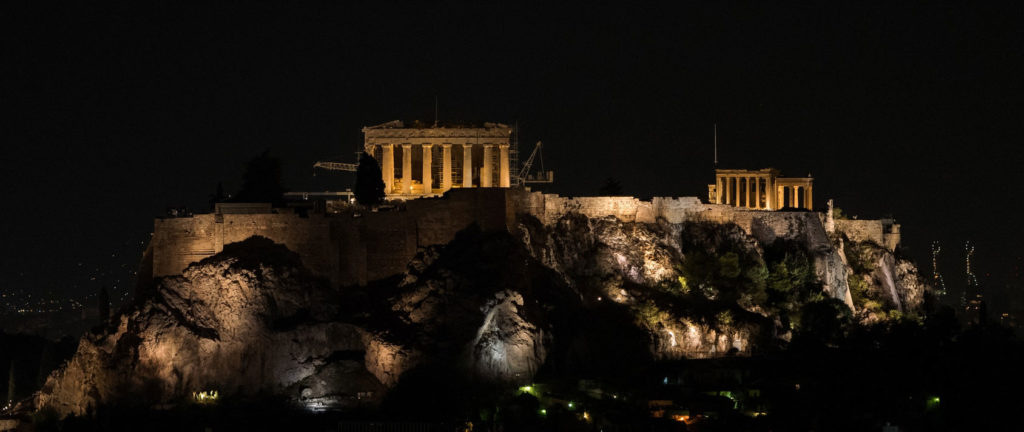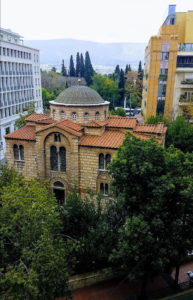By Jacqueline Swartz
Returning to Athens after more than a dozen years seemed like an emotional Odyssey. Would it still be the city I knew so well? Would I be able to appreciate the creative unpredictable, even when it turned infuriating? Would the people I knew from years of writing dispatches for Canada’s leading publications remember me after years of dwindling contact?
Hanging over it all was a tragic reality. Not the Covid Pandemic, but a Europe-imposed austerity everyone called “the crisis.” It impoverished the middle-class and was strangling entrepreneurs. Greece, especially Athens, was suffering spending cuts and extreme taxes imposed by a troika of creditors: The European Commission, European Central Bank, and the International Monetary Fund. This asphyxiation of the Greek economy through unpayable loans, spending cuts and tax increases was a kind of mirror image of what I saw in the early 2000’s
Back then Greece was luxuriating in an economic boom, augmented by a gushing infusion of cash from the Olympics. There was notorious overspending by successive governments. And as the years went by many of the Olympic sites were left to rot. Yet what had been built was spectacular. Major new roads, a new airport and a metro that went all the way to the airport made Europe’s oldest capital modern. There were also restored museums and renovated neo-classic homes, pedestrian streets and repaired sidewalks.
But with all I had been reading about the Greek economy, I feared seeing a city with empty storefronts and homeless people.
What I found were jazzy new hotels, with lower prices than you’d find in other European capitals plus a sophisticated restaurant scene ranging from Michelin stars to juice bars. Every café, no matter the price point, was using local fruit, vegetables and cheese from just down the road or from a nearby country farm.
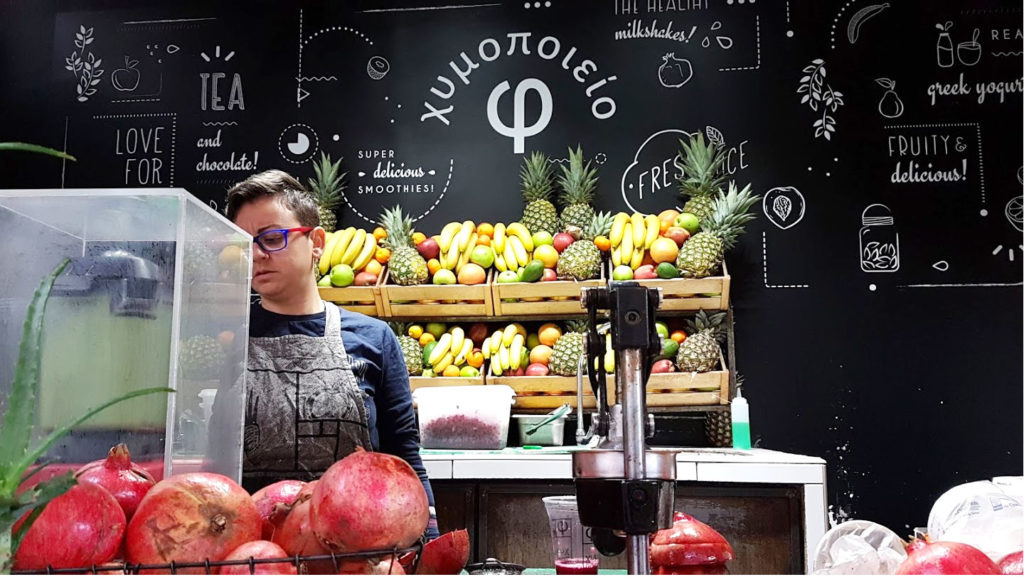
Athens markets and cafes serve a wide variety of locally grown fruits and vegetables at affordable prices. Photo by Jacqueline Swartz
So I was forced to ask myself, why the boom at a time of austerity, not to mention the thousands of immigrants landing on Greek shores?
The quick answer is tourism. Unlike Egypt and Turkey, Greece is considered safe. Its islands are still enchant and English is widely spoken. Athens’ gleaming, prize-winning airport is used by numerous airlines. Before Covid shuttered the country, five million tourists annually visited Athens.
From cooperative galleries to museums, theatre and dance, the city is bustling with cultural events. The Stavros Niarchos Foundation and Cultural Centre designed by starchitect Renzo Piano had just opened. It now houses the Opera House and the National Library, which has a kayaking canal in a nod to Greece’s seafaring history. Ship owners like Niarchos traditionally avoid paying taxes in Greece, but a number have contributed museums and cultural centers. And the new venues are attracting music and dance companies from across Europe.
The crisis gave the city an edginess – graffiti, but also more of a bohemian vibe. Maybe that is why the prestigious German art show, Documenta 14, chose Athens for its exhibits that attracted more than 340,000 visitors.
The district of Exharchia, known as the anarchists quarter, is drawing people who work for NGO’s, including UNHCR. Many have come because of the refugees. Athens shelters 12,000 migrants, about half of whom are expected to stay.
I remember Exharchia from evenings spent in an old taverna called Lefkas. The outdoor setting, with its pebbly floors, scattered trees and stacks of wine barrels seemed far from the city. The conversation was always heated, yet full of wit. Today, Lefkas continues serving traditional food, including the best fava bean dip I have ever tasted. Surprisingly, it hasn’t become touristy.
But I had come to Athens to check out the new – except for my friends, that is.
George Papadatos, a friend from the old days, still runs a bookstore called Erato. A savant of the authentic, he takes me to Genomai and Agenomai (roughly translated as “I taste and I am fascinated”), a small eatery on Nileos, a quiet street in Thisseio, part of the old city northwest of the Acropolis. The area is now trendy, with low-rise neo-classic houses, inspired by classical Greek architecture by way of Europe, and sidewalks dotted with lemon trees. The food – crusted grilled octopus and tasty cooked greens – is fresh and expertly prepared.
I wanted to visit some of the cool new areas of this city that keeps on being discovered. George suggests Metaxourgeio, a formerly overlooked neighborhood that is now on the move. It is a mix of grungy streets, theatres, galleries and some of the best restaurants in Athens. The Metaxourgeio metro’s theme (every metro has one) happens to be the work of my favorite living Greek artist, Alekos Fassianos.
One of the pioneers of the area, Rebecca Camhi, lives in the neoclassic building that houses her well-known gallery, which includes international and Greek artists working in a variety of media. The best way to get there is by taxi. Athens cabs are plentiful and cheap, except to and from the airport.
“People stopped buying art during the first few years of the crisis,” she says. “Now, when things are worse, they have accepted the new reality and started buying again.” This seemed typical of the resignation I saw around me: “Ti na kanome“, what can we do?
When the shock of Covid 19 arrived, Greece surprised a disorganized Europe with its discipline. Today, the country is open to visitors from Europe and around the world. There is no quarantine for those who are fully vaccinated or have undergone a test within 72 hours,
Camhi showed me a map she has drawn of places to go in the area. A must-see is Avdi Square next to the Municipal Gallery of Athens. It has lots of green space and some restaurants well worth trying. She recommended Seychelles, a rustic/minimalist place with specialties from various regions around Greece.
By now it was clear – Athens still has its ineffable hold on me. The scent of pine, lemon and jasmine just around the corner from congested streets, the unexpected, the encounters that break through the impersonal with a smile.
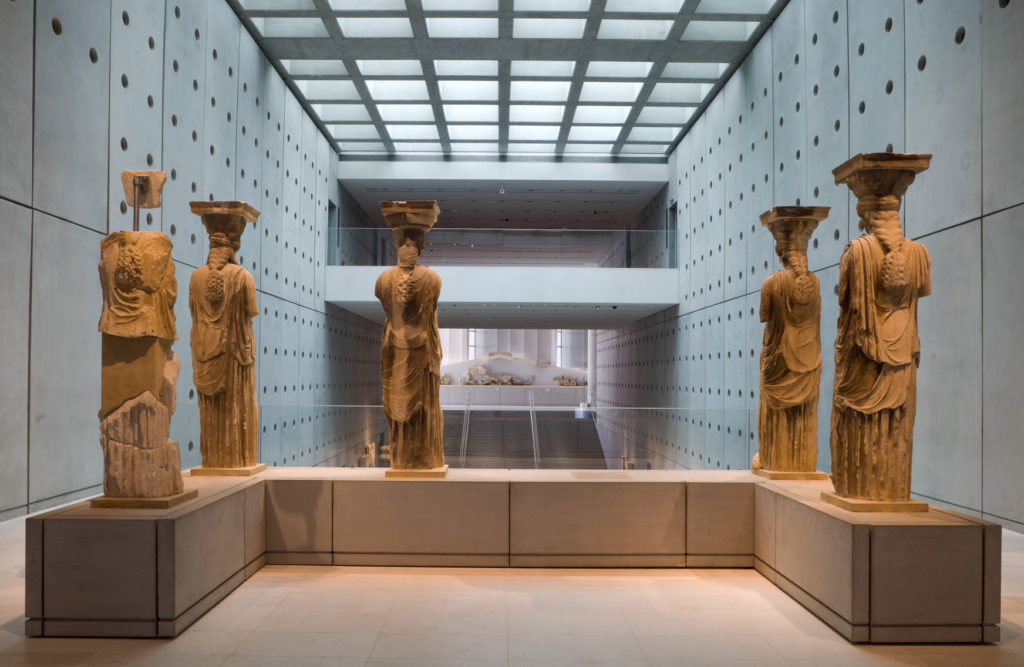
Inside the Acropolis Museum stand five Karyatides maidens. They once held up the Erechtheion Temple to Athena and Poseidon on the north side of the Acropolis. They now enjoy a pollution-free environment. A sixth maiden resides in the British Museum. Replicas of these originals now support the temple roof. Photo by Nikos Daniilidis
No visitor to Athens should leave without seeing the Acropolis Museum. Opened in 2009 to house the artifacts from the Acropolis and nearby sites, it is a dazzling, modernist building, just down the hill from the Parthenon. The museum stands above an archeological site dating back to Byzantine times and is visible through a plexiglass floor. There are three levels, and the statues are placed so that the slow escalator ride to another floor is like viewing a video. The bright Attic light illuminates the sculpture, hinting at the way the ancients might have seen it. I recall the shabby display cases in the old museum and give thanks Athens now has a museum deserving of the wonders of Classical Greece.
In the first floor Archaic Gallery are the beguiling kore statues of young women in draped clothing carrying votive offerings to the goddess Athena. The top floor’s Parthenon Gallery displays a 160-meter long frieze. Stark plaster replicas indicate the pieces Lord Elgin hacked off and sold to the British Museum. An accompanying video in English asserts that with this technically advanced museum, there is no reason not to return the marbles to their place of origin.
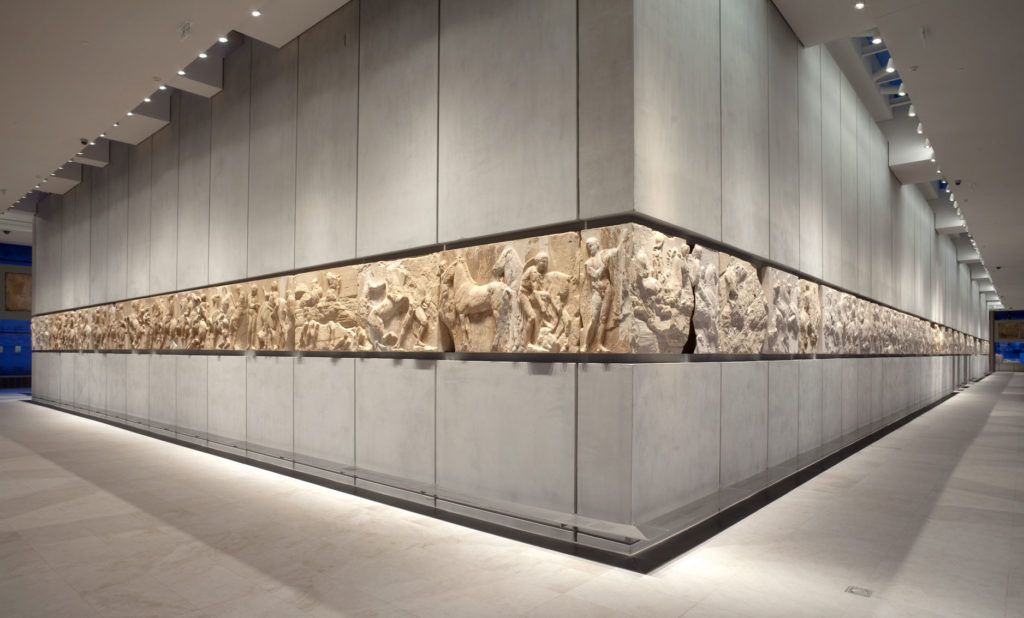
On the top floor of the Acropolis Museum there is a replica of a 160-meter long frieze that once wrapped around the southwest corner of the Parthenon. Some of the original carved marble tablets now sit in the British Museum. Greece wants their cultural heritage returned. Photo by Nikos Daniilidis
The walk to the Acropolis Museum is a delight in itself. From the centrally located New Hotel, where I stayed, I walked through the chic part of the Plaka past jewelry stores like Vergina Gallery, at 24 Kidathineon Street and cafes in restored neo-classic buildings painted in pastel colors. This is not the flea market area of Monistiraki, but an elegant route to the “sacred rock” Athenians call the Acropolis.
On the way back to my hotel, I took a different route and find streets like Ermou that used to be clogged with traffic but are now reserved for strolling pedestrians shopping everything from fashions to face cream.
From the New Hotel it’s a short walk to the Grand Bretagne, Athens’ historic grand hotel. In the opulent lobby bar I meet with Dimitris Mitropoulos, a noted Athens journalist, columnist and TV pundit whose career has included stints as an editor of the major paper, Ta Nea. I’m here to ask him about the roots of the economic crisis. I had read about the bailouts in the hundreds of billions of euros, about Syriza, the left-wing government and its leader, Alexis Tsipras, who, during an all-night session of extreme pressure, caved into the European group. The result was increased austerity that seems punitive rather than productive. Writing in the New York Times, economist Paul Krugman asserted that “the Greek economy collapsed, largely as a result of those very austerity measures, dragging revenues down with it”.
Greece, says Mitropoulos, should be experiencing robust growth. ” But politicians over-promised and citizens expected more and more. Successive governments from both right and left simply failed to reform the public sector.” Of course, being tied to the Euro makes things worse since Greece cannot devalue its currency.
Mitropoulus, like almost everyone I spoke to, blames the situation on the present and past governments, while the troika of creditors who imposed the austerity seem like distant villains.
In July 2019, the journalist was appointed head of European Affairs by the center-right government of newly elected Prime Minister Kyriakos Mitsotakis. But by August 2020, he had left.
One object of blame I encountered, again and again, is former finance minister and rock-star economist, Yanis Varoufakis. Critics accuse him of arrogance (a description I heard again and again), of not playing nice with the creditors, thereby bringing down their wrath, and escalating the price Greece had to pay for avoiding the dreaded Grexit.
In numerous articles, Varoufakis has explained why Greece should not have accepted the creditors’ loans since it had bargaining power in the fact that the price tag of total default and departure from the EU would have been unacceptable. Varoufakis resigned as finance minister and wrote a book, Adults in the Room, about his six-month stint dealing with Eurocrats in Brussels.
Varoufakis is now a member of Parliament and vocal critic of the center-right government. Others point to its successes: digitizing the country, lowering taxes and aiming to modernize sclerotic aspects of banking and government. Getting twice as much funding as expected from the European Union will help.
One program aims to attract digital nomads to Greece’s tax advantages and low cost of living. And in a country where loneliness is unacceptable, there’s even a provision for the social and psychological aspects of living off your laptop.
And what about the talented, educated Greeks who left? Brain gain is a new buzzword that refers to the return of talented young people who left because of poor economic prospects.
I asked Mitropoulos about what I had heard about the theater. “Cultural life is flourishing,” he smiles. “Theatre and music festivals are full, people are buying books.” How to explain it? He shrugged: “It’s love in the time of cholera”.
Up the street from the Grande Bretagne Hotel and Constitution Square, is Kolonaki, the charming, upscale district of Athens that lies below Mt. Lycavettos. Melina Mercouri used to live here, and though it is central, it seems to attract far fewer tourists than the Plaka. Although many of the stores have changed, Kolonaki looks the same with its chic low-rise stores, marble sidewalks and cafes surrounding the central square.
Revisiting the Goulandris Museum of Cycladic Art I was moved by the collection of pared-down, mysterious yet modern-looking figures dating from 3200 BC.
Nearby, at 34 Skoufa Street, a cafe I used to know as Dolce is now called Filion. It still attracts journalists, poets and politicians, and is picturesquely situated opposite a 19th-century Greek Orthodox Church. I am meeting Dino Siotis, poetry impresario and former press attaché at the Greek Embassy in Boston, New York and Toronto.
After hugs, I asked him about the economic crisis. But Dino would rather talk about the festivals he is organizing, like the Athens World Poetry Festival. “There is so much poetry of high quality”, he says. People are reading, he insists. Bookstores are hosting readings and operating as cafes. During a depression?
A man in a red scarf waves at Dino. It is his friend, Konstantine Bourlas, a noted theatre critic who writes books on Ancient Greece and has a weekly TV book show. Dino has to leave, but Konstantin, he says, will enlighten me.
Theatre? “I could go to a different production every night”, he says. “Of course, not everyone gets paid (but that’s the same anywhere). Many have day jobs, but so what?”
“For us the word dilettante is flattering,” he says. “Engineers are poets, doctors can be musicians.” Thus begins a two-hour conversation with one of the most erudite people I have ever met.
“Greeks are anarchists”, Bourlas gestures with a flourish. “Even chaos had its roots in ancient times. Greeks were united fighting the Persians – until they fought among themselves.
“The Greek curse is the blind-spot,” he continues. “Look at Oedipus: He solved the riddle of the Sphinx and then was blind to his own family drama. We are geniuses and idiots at the same time.”
The EU is part of a continuum, he explains. “We were part of the Roman, Byzantine and Ottoman Empires, just as long as we paid our taxes. “Now we pay more than half our income,” he says, adding that life in Athens is not expensive.
“You can go to the farmers market and buy a kilo of apples or pomegranates for one euro.”
But with all its problems, Bourlas, who earned a theatre criticism degree in Paris and has also lived in New York, chooses to live in Athens.
“Each day is unpredictable, is magical.”
The brilliant and the exasperating. But most of all the personal, the charm, and often the paradox. It is, after all, a Greek word.
Be Sure to Visit
Kolonaki District:
COCO-MAT Hotel. When this four-star hotel, on one of the most chic streets in Athens, claims to offer the “best sleeping experience in Athens”, you can believe it. The hotel is owned by a successful mattress company, whose four-layer mattresses, made of all-natural materials, are sought after, despite their high prices. On street level you first encounter a lobby doubling as a stylishly decorated showroom, with mattresses, sheets, and towels (check-in is one floor below). Upstairs, the airy rooms are furnished with natural materials of wood and stone. The breakfast room, adjacent to the check-in desk, is one-floor below. You can head to the meusli bar and pastry basket also and order eggs whichever way you want them. There is also a wine selection that runs on the honor system.
KEM, Patriarchou Ioakim 26.. Down the street from COCOMAT, KEM sells stylish handbags, mostly in leather from Greece.
Papadakis. Celebrity chef Argiro Barbarigou has created one of Athens’ best seafood restaurants in a former house with serene grey walls, a few large paintings and fresh flowers. Or you can dine outside below the orange trees. If there is a Chez Panisse of Greece, this is it. Ingredients are meticulously sourced, from the homemade bread served with olive oil, to the salad of cherry tomatoes with caper leaves and fresh cheese from Paros, Barbarigou’s native island. The restaurant is known for its octopus caramelized with honey, wine sauce and sun-dried tomatoes, and its grouper with a lemon fricassee of lettuce and celery root. The mille feuille, Greek style. uses crispy filo and yogurt. There’s a tasting menu and an impressive Greek wine list.
Yolenis Greek Gastronomy, 9 Solonos. From olive oil tastings to a beef restaurant, cheese to tomatoes, this four-story emporium of Greek products has in two years become a fixture of the neighborhood and a magnet for seekers of the best in Greek products. A wine bar in the lower level offers an education in local wines for seven euros for a flight of three 75 ml pours. Philo pies are inspired by various regions of Greece
Metaxourgeiou District
Aleria. The setting for this ultimate in Athenian fine dining is a neoclassic villa with several rooms and a large, tree-shaded courtyard. With impeccable service and imaginative presentation, Aleria, the buzz has it, could well be on its way to a Michelin star. The classic baked pasta dish called pastitsio is re-imagined with thick pasta, oxtail, shitake mushrooms with a béchamel foam and a cinnamon and parmesan crust. Croaker fish (like halibut) is layered with cauliflower, carrot, beetroot, chervil, red chard and hibiscus. Bavette steak is enhanced with salsify, a seldom used root vegetable that tastes like oyster, cured pork, chard and Pecorino cheese. And there’s a menu of Greek cheeses. Like Greek wines, they are presented with pride.
Seychelles. This super-cool eatery combines minimalist rustic decor with inventive hearty fare. The name doesn’t refer to the food, which is Greek/Mediterranean. It’s as fanciful as the restaurant, on picturesque Avdi Square. Reservations advised.
Constitution Square
New Hotel. This 5-star renovation of the 79-room Olympic Palace Hotel features high design, notable service and amenities like a spa, conference spaces and a rooftop lounge with hundreds of art books. Dakis Joannou, a major collector of contemporary – art bought the old hotel and hired a jazzy Brazilian design team to redo it; they repurposed already existing materials like wood and velvet chairs. The only thing left of the old hotel is its unbeatable location.![]()
Jacqueline Swartz’s past stories for EWNS include a profile of Montreal and a look at rhino safaris in India.


